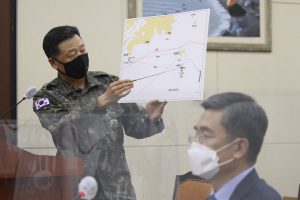South Korea said Thursday that North Korean troops fatally shot a South Korean government official who may have attempted to defect and set his body on fire after finding him on a floating object near the countries’ disputed sea boundary.
South Korean officials condemned what they called North Korea’s “atrocious act” and urged it to apologize and punish those responsible. North Korea is unlikely to accept the South Korean demand, and ties between the rivals — already strained amid a deadlock in broader nuclear diplomacy — will probably suffer a further setback, observers say.
According to Seoul, the man disappeared from a government ship that was checking on possible unauthorized fishing in an area south of the boundary on Monday, a day before he was found in North Korean waters.
North Korea sent officials wearing gas masks aboard a boat near the man to learn why he was there on Tuesday afternoon. Later in the day, a North Korean navy boat came and opened fire at him, South Korea’s Defense Ministry said.
Sailors from the boat clad in gas masks and protective suits poured gasoline on his body and set it aflame, the Defense Ministry said, citing intelligence gathered by surveillance equipment and other assets.
It’s unclear how he ended up in North Korea. But a defense official said the man might have tried to defect to the North, citing acquired information. He refused to elaborate. The official, requesting anonymity citing department rules, said the South Korean official was wearing a life jacket and was on a small floating object when he was found in North Korean waters.
He said North Korea may have decided to kill him in line with its stringent anti-coronavirus rules that involve shooting anyone illegally crossing the border.
General Robert Abrams, the commander of U.S. troops in South Korea, said last month that North Korea had put special forces along its border with China to keep smugglers out and that they had “shoot-to-kill orders in place” aimed at preventing the virus from entering the country.
North Korea has steadfastly said there hasn’t been a single virus case in its territory, a claim widely disputed by foreign experts. Observers say a pandemic could cause devastating consequences in North Korea because of its broken public health care system and a chronic shortage of medical supplies.
South Korea sent a message to North Korea on Wednesday to ask about the missing official, but hasn’t received a response, according to the South Korean Defense Ministry.
Senior military officer Ahn Young Ho told reporters Thursday that South Korea strongly condemned North Korea’s “atrocious act” and urged it to punish those responsible. Top presidential official Suh Choo-suk said in a separate news conference that North Korea must apologize for its “act against humanity,” reveal the full details of the case and take steps to prevent similar incidents.
“For whatever reason, North Korea cannot justify its soldiers fatally shooting our citizen and damaging his body, though he was unarmed and had no intention of resistance,” Suh said.
President Moon Jae-in called the incident “shocking,” “intolerable,” and “very regrettable.” He ordered the military to strengthen its readiness.
Little is known about the late 49-year-old South Korean, except that he was among 18 officials aboard the government boat belonging to the Oceans and Fisheries Ministry. When his colleagues searched for him after his disappearance, they only found his shoes left on the ship’s stern. Days of searching involving aircraft and vessels were unsuccessful, according to the Defense Ministry.
The oceans ministry said Thursday it has no evidence indicating the late official tried to defect or accidently fell from the ship. It said the official didn’t tell his colleagues about any plan to defect and left most of his belongings like clothes and daily necessities on the ship.
Several bloody naval skirmishes and two deadly attacks blamed on North Korea have occurred in recent years at the countries’ poorly marked western sea boundary. The government ship was near South Korea’s Yeonpyeong Island, which was hit by North Korean artillery in 2010, killing four people.
The incident is expected to worsen already frosty ties between the Koreas, whose exchanges and cooperation programs have virtually been halted. In June, North Korea blew up an inter-Korean liaison office to protest South Korean civilians sending leaflets against the North across the border.
Some experts said the government explanation that the official might have attempted to defect lacked evidence. They said the government may want to prevent strong anti-North Korean sentiment to keep alive chances for talks between the nations.
“A public servant defecting to North Korea? I think it sounds a bit strange as he has stable job security,” said Choi Kang, vice president of Seoul’s Asan Institute for Policy Studies. “Why did North Korea shoot a man defecting to the North voluntarily? I can also say the burning of his body was an attempt to conceal evidence.”
Moon’s liberal government has faced criticism by conservatives that it sympathizes too much with North Korea and failed to respond strongly enough to the North’s past provocations, such as the destruction of the liaison office and crude insults against the South.
In 2008, North Korean soldiers fatally shot a visiting South Korean tourist who wandered into a restricted area at the North’s scenic Mount Kumgang resort. South Korea’s then conservative government responded by suspending tours to the resort.
The opposition conservative People Power Party urged Moon’s government to take stern action. “The reason for the government’s existence is protecting its people and their property,” it said in a statement.
Defections of South Koreans to North Korea are highly unusual. More than 30,000 North Koreans have fled to South Korea in the past 20 years for political and economic reasons.
In July, however, a North Korean defector slipped back into North Korea, prompting the North to impose a lockdown of a border city and declare a state of emergency over virus concerns.
By Hyung-Jin Kim for the Associated Press in Seoul.

































